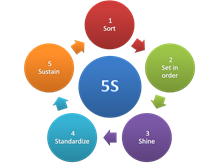"5S" and "7 Wastes" Open
Workshop
“5S, that’s just all about keeping things organized and tidy, isn’t it?
Or maybe you have heard someone say: “Why make a big deal out of cleaning up?”
But 5S is not really about the aesthetics of the work place, or even about the
efficiency gains you will achieve (typically, 10% to 30% can be easily
achieved). The real benefit of 5S is the introduction of standardised
operational practices to ensure efficient, ergonomic, repeatable, safe ways of
working. This brings many benefits: higher quality, lower costs, reliable
deliveries, increased morale, and improved safety … to name but a few. It will
also result in a highly visual workplace. One of the most important results of
5S is that it makes problems immediately obvious.
5S works by helping the team eliminate the seven wastes of lean manufacturing:
Waste in Transport, Inventory, Motion, Waiting, Over-processing,
Overproduction, and Defects.
It is therefore one of the most
powerful Lean Tools, and provides a stable foundation upon which to build all
of your other improvement programs, Lean Tools and Practices. It is also one of
the simplest to implement, and can be applied within your manufacturing
environment, office processes or even within a service industry.
5S is a team approach and requires the participation of everyone within
the area in which it is applied to be effective.
This one day course will provide
you with a comprehensive overview of the 5S Process and how you can implement
it to your organization.
WORKSHOP CONTENT
Introduction
- Background and History
- What “5S” is, what “5S” is not
“5S” Process
· Sorting
· Straighten
· Shining
· Standardize
· Sustaining
Implementing “5S”
- Identify the pilot area
- Documentation of the Present State
- Follow the “5S” Process
- Standardization: Visual Factory, SOP’s, etc.
Verification and Standardization
·
Management
commitment
·
“5S”
Audit process and metrics
·
“5S”
Scorecard and “5S” Board
·
“5S”
Plant walk process
Identifying Waste
·
The 7
Wastes
·
Value
Added and Non-Value Added Operations
Tools to Identify Waste
·
Process
Mapping
·
Spaghetti
Diagram
·
Process
Balancing
·
Push
or Pull?
·
Value
Stream Mapping
·
PDCA
Approach
This
workshop can also be delivered in-house as a stand-alone training workshop or
integrated into wider improvement activities.
We will be happy to discuss our 5S & 7 Wastes course in the context of your own business needs, so please contact us via email at compete@cforc.org or phone +44 (0)28 9073 7950 or our Dublin office +353 8 7224 2575 for more information.


